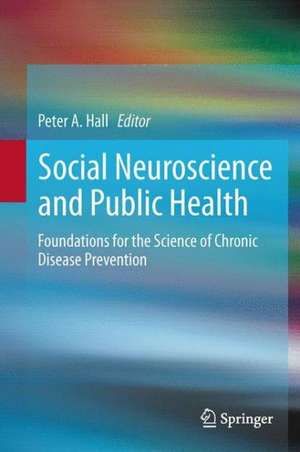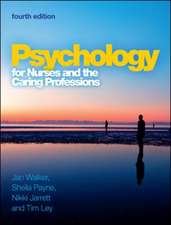Social Neuroscience and Public Health: Foundations for the Science of Chronic Disease Prevention
Editat de Peter A. Hallen Limba Engleză Hardback – 25 mai 2013
| Toate formatele și edițiile | Preț | Express |
|---|---|---|
| Paperback (1) | 1096.45 lei 6-8 săpt. | |
| Springer – 22 iun 2015 | 1096.45 lei 6-8 săpt. | |
| Hardback (1) | 1101.21 lei 6-8 săpt. | |
| Springer – 25 mai 2013 | 1101.21 lei 6-8 săpt. |
Preț: 1101.21 lei
Preț vechi: 1159.17 lei
-5% Nou
Puncte Express: 1652
Preț estimativ în valută:
210.71€ • 220.00$ • 174.39£
210.71€ • 220.00$ • 174.39£
Carte tipărită la comandă
Livrare economică 04-18 aprilie
Preluare comenzi: 021 569.72.76
Specificații
ISBN-13: 9781461468516
ISBN-10: 1461468515
Pagini: 336
Ilustrații: XVI, 318 p.
Dimensiuni: 155 x 235 x 22 mm
Greutate: 0.59 kg
Ediția:2013
Editura: Springer
Colecția Springer
Locul publicării:New York, NY, United States
ISBN-10: 1461468515
Pagini: 336
Ilustrații: XVI, 318 p.
Dimensiuni: 155 x 235 x 22 mm
Greutate: 0.59 kg
Ediția:2013
Editura: Springer
Colecția Springer
Locul publicării:New York, NY, United States
Public țintă
ResearchDescriere
Traditionally, neuroscience and public health have been considered strange bedfellows. Now a new collection of studies shows the two fields as logical collaborators with major potential for the evolution of both fields.
Social Neuroscience and Public Health assembles current theoretical viewpoints, research findings in familiar and emerging areas, and updates on assessment methods to give readers a unique in-depth guide to the social brain and its central role in health promotion. This stimulating reference spans the intersection of two disciplines, offering new insights into the mechanics of risks, rewards, and willpower, revisiting the developmental effects of adversity and the impact of exercise on brain health, and applying epidemiology to cognitive science. Accessibly written for researchers and professionals within and outside both fields, the chapters include bullet-point and policy implication features for ease of retention. The book's innovative ideas lend themselves to a variety of applications, from fine-tuning disease prevention strategies to deeper understanding of addictions. Included in the coverage:
Social Neuroscience and Public Health assembles current theoretical viewpoints, research findings in familiar and emerging areas, and updates on assessment methods to give readers a unique in-depth guide to the social brain and its central role in health promotion. This stimulating reference spans the intersection of two disciplines, offering new insights into the mechanics of risks, rewards, and willpower, revisiting the developmental effects of adversity and the impact of exercise on brain health, and applying epidemiology to cognitive science. Accessibly written for researchers and professionals within and outside both fields, the chapters include bullet-point and policy implication features for ease of retention. The book's innovative ideas lend themselves to a variety of applications, from fine-tuning disease prevention strategies to deeper understanding of addictions. Included in the coverage:
- Latest theoretical perspectives on health behavior (e.g., picoeconomics, MCII, and temporal self-regulation theory)
- Updates on health communications and their effects on the brain.
- New research on cognitive resources and health behavior execution.
- Leading-edge studies on the brain, the social world, and stress.
- Findings from the forefront of exercise neuroscience.
- A concise introduction to neuroscience methods for the non-technical reader.
Cuprins
I. Theoretical Perspectives.- Preface.- Chapter 1: Picoeconomics in Neural and Evolutionary Contexts.- Chapter 2: Neurophysiological Correlates of the Self-Regulation of Goal Pursuit.- Chapter 3: Temporal self-regulation theory: Integrating biological, psychological and ecological determinants of health behavior performance.- II. Health Communication.- Chapter 4: Health Communications: Predicting Behavior Change From the Brain.- Chapter 5: Neurobiological bases of self-reference and deliberate processing in tailored health communication.- III. Health behaviors.- Chapter 6: Neurocognition and Medication Adherence in HIV Infected Adults.- Chapter 7: Alcohol Consumption and Self-Regulation.- Chapter 8: The Strength Model of Self-Control: Recent Advances and Implications for Public Health.- Chapter 9: Incentive-Based Interventions: Historical Context and New Directions.- IV. Social Connections, Socioeconomic status and Stress.- Chapter 10: Social Relationships and Public Health.- Chapter 11: Brain functions modulating redistribution of natural killer cells accompanying cognitive appraisal of acute stress.- Chapter 12: Alzheimer's Dementia and Lifestyle – Towards a Primary Prevention.- Chapter 13: Social determinants of self-regulation development.- V. Exercise Neuroscience.- Chapter 14: Physical Activity, Cardiorespiratory Fitness and Cognition across the Lifespan.- Chapter 15: Brain glycogen decrease and supercompensation with prolonged exhaustive exercise.- Chapter 16: Resistance Training and Cognitive and Cortical Plasticity in Older Adults.- VI. Methods Primer.- Chapter 17: Brain Imaging: A primer.- Chapter 18: Survival analysis in social neuroscience and public health: A research exemplar from the field of cognitive epidemiology .- Chapter 19: Neurobiological facets of food craving and consumption: Evidence from Neuropsychological and Transcranial Magnetic Stimulation (TMS) Studies.-
Recenzii
From the reviews:
“This book on chronic disease prevention explores cognitive processes to reveal their relationship to health behaviors and considers the public health implications. … This book addresses the need for public health initiatives to encourage individuals with chronic diseases to take care of themselves. It shows the relationship between neuroscience and willpower in terms of evaluating risks and rewards. Researchers, practitioners, and policymakers will benefit greatly of this information.” (Gary B. Kaniuk, Doody’s Book Reviews, November, 2013)
"This bridge-builder of a book comes exactly at the right time. With the field of public health rapidly expanding, public health professionals, neuroscientists, social psychologists, and policymakers alike will profit from this immensely integrative achievement. Social Neuroscience and Public Health connects two fast-developing fields that can learn and profit immensely from each other."
- Wilhelm Hofmann, Ph.D., University of Chicago, Booth School of Business
"In this book you will find a number of intriguing possibilities for changing behaviour that arise out of a scientific base hitherto little known beyond the field. Bringing this together has immense potential not just for strengthening public health but also for strengthening behavioral and neuro-sciences."
-Theresa Marteau, Ph.D., Institute of Public Health, University of Cambridge
"This book is a remarkable collection of the latest advances in theory and research at the interface of neuroscience and public health. It is an indispensable resource for researchers whose interests span across health psychology, cognitive neuroscience, health communications, prevention sciences, and public health.
Providing new foundations for scientific research on chronic disease prevention, this volume will undoubtedly define the field for years to come."
-Linda Cameron,Ph.D., Dept.of Psychology,University of California
“This book on chronic disease prevention explores cognitive processes to reveal their relationship to health behaviors and considers the public health implications. … This book addresses the need for public health initiatives to encourage individuals with chronic diseases to take care of themselves. It shows the relationship between neuroscience and willpower in terms of evaluating risks and rewards. Researchers, practitioners, and policymakers will benefit greatly of this information.” (Gary B. Kaniuk, Doody’s Book Reviews, November, 2013)
"This bridge-builder of a book comes exactly at the right time. With the field of public health rapidly expanding, public health professionals, neuroscientists, social psychologists, and policymakers alike will profit from this immensely integrative achievement. Social Neuroscience and Public Health connects two fast-developing fields that can learn and profit immensely from each other."
- Wilhelm Hofmann, Ph.D., University of Chicago, Booth School of Business
"In this book you will find a number of intriguing possibilities for changing behaviour that arise out of a scientific base hitherto little known beyond the field. Bringing this together has immense potential not just for strengthening public health but also for strengthening behavioral and neuro-sciences."
-Theresa Marteau, Ph.D., Institute of Public Health, University of Cambridge
"This book is a remarkable collection of the latest advances in theory and research at the interface of neuroscience and public health. It is an indispensable resource for researchers whose interests span across health psychology, cognitive neuroscience, health communications, prevention sciences, and public health.
Providing new foundations for scientific research on chronic disease prevention, this volume will undoubtedly define the field for years to come."
-Linda Cameron,Ph.D., Dept.of Psychology,University of California
Notă biografică
Peter Hall, PhD, CPsych, is an associate professor of applied health sciences at the University of Waterloo (UW), where he is jointly appointed to the School of Public Health and Health Systems and to the Department of Kinesiology (Neuroscience research group). Dr. Hall is a past recipient of the Canadian Institutes for Health Research (CIHR) New Investigator Award, and an Early Career Award from the Canadian Psychological Association (Health Psychology section). He is founding director of the UW Social Neuroscience and Health Laboratory. His research examines the joint contributions of social-cognitive and neurocognitive factors to the production of health behavior trajectories in everyday life. Dr. Hall serves on the editorial boards of Health Psychology and Journal of Behavioral Medicine, and he is associate editor for the Encyclopedia of Behavioral Medicine, as well as the forthcoming Springer volume, Behavioral and Social Science in Medicine. He is a licensed clinical psychologist andhas more than a decade of experience providing clinical services to chronic illness populations in multidisciplinary healthcare settings.
Textul de pe ultima copertă
Traditionally, neuroscience and public health have been considered strange bedfellows. Now a new collection of studies shows the two fields as logical collaborators with major potential for the evolution of both fields.
Social Neuroscience and Public Health assembles current theoretical viewpoints, research findings in familiar and emerging areas, and updates on assessment methods to give readers a unique in-depth guide to the social brain and its central role in health promotion. This stimulating reference spans the intersection of two disciplines, offering new insights into the mechanics of risks, rewards, and willpower, revisiting the developmental effects of adversity and the impact of exercise on brain health, and applying epidemiology to cognitive science. Accessibly written for researchers and professionals within and outside both fields, the chapters include bullet-point and policy implication features for ease of retention. The book's innovative ideas lend themselves to a variety of applications, from fine-tuning disease prevention strategies to deeper understanding of addictions. Included in the coverage:
“This bridge-builder of a book comes exactly at the right time. With the field of public health rapidly expanding, public health professionals, neuroscientists, social psychologists, and policymakers alike will profit from this immensely integrative achievement. Social Neuroscience and Public Health connects two fast-developing fields that can learn and profit immensely from each other.” -- Wilhelm Hofmann, PhD, University of Chicago, Booth School of Business
“In this book you will find a number of intriguing possibilities for changing behaviour that
arise out of a scientific base hitherto little known beyond the field. Bringing this together
has immense potential not just for strengthening public health but also for strengthening
behavioral and neuro-sciences.” –Theresa Marteau, PhD, Institute of Public Health, Unviersity of Cambridge
Social Neuroscience and Public Health assembles current theoretical viewpoints, research findings in familiar and emerging areas, and updates on assessment methods to give readers a unique in-depth guide to the social brain and its central role in health promotion. This stimulating reference spans the intersection of two disciplines, offering new insights into the mechanics of risks, rewards, and willpower, revisiting the developmental effects of adversity and the impact of exercise on brain health, and applying epidemiology to cognitive science. Accessibly written for researchers and professionals within and outside both fields, the chapters include bullet-point and policy implication features for ease of retention. The book's innovative ideas lend themselves to a variety of applications, from fine-tuning disease prevention strategies to deeper understanding of addictions. Included in the coverage:
- Latest theoretical perspectives on health behavior (e.g., picoeconomics, MCII, and temporal self-regulation theory)
- Updates on health communications and their effects on the brain.
- New research on cognitive resources and health behavior execution.
- Leading-edge studies on the brain, the social world, and stress.
- Findings from the forefront of exercise neuroscience.
- A concise introduction to neuroscience methods for the non-technical reader.
“This bridge-builder of a book comes exactly at the right time. With the field of public health rapidly expanding, public health professionals, neuroscientists, social psychologists, and policymakers alike will profit from this immensely integrative achievement. Social Neuroscience and Public Health connects two fast-developing fields that can learn and profit immensely from each other.” -- Wilhelm Hofmann, PhD, University of Chicago, Booth School of Business
“In this book you will find a number of intriguing possibilities for changing behaviour that
arise out of a scientific base hitherto little known beyond the field. Bringing this together
has immense potential not just for strengthening public health but also for strengthening
behavioral and neuro-sciences.” –Theresa Marteau, PhD, Institute of Public Health, Unviersity of Cambridge
Caracteristici
The first book of its kind, this volume builds new bridges between the fields of social neuroscience and public health
Reviews a critical mass of empirical research and theory regarding brain-behavior relationships that have relevance to the science of chronic disease prevention
The simultaneous coverage of basic and applied research will be of interest to scientists, practitioners and policymakers alike
Reviews a critical mass of empirical research and theory regarding brain-behavior relationships that have relevance to the science of chronic disease prevention
The simultaneous coverage of basic and applied research will be of interest to scientists, practitioners and policymakers alike









![Promoting Psychological Well-Being in Children with Acute and Chronic Illness: A Step-By-Step Resource [With CD (Audio)]](https://i2.books-express.ro/bt/9781843109679/promoting-psychological-well-being-in-children-with-acute-and-chronic-illness.jpg)

